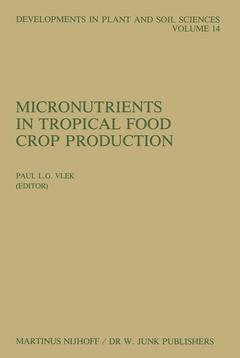Micronutrients in Tropical Food Crop Production, Softcover reprint of the original 1st ed. 1985 Developments in Plant and Soil Sciences Series, Vol. 14
Langue : Anglais
Coordonnateur : Vlek Paul L.G.

The mission of the International Fertilizer Development Center is to increase food production through the improvement of fertilizers and fertilizer practices for the developing countries with special emphasis on tropical and subtropical agriculture. The principal aim is to ensure that fertilizer technology is not a limiting factor to food production in those regions. Although the full extent to which deficiency of micronutrients hampers food production is yet un known, there is ample evidence that problem areas exist and more will be identified as crop production is intensified and marginal lands are exploited. Therefore, it seems fully appropriate at this time that IFDC, as an international organization, take a leadership role in developing micronutrient fertilizer technology appropriate for the tropics and subtropics. The gravity of micronutrient deficiency as a limiting factor to crop pro duction varies from crop to crop and from soil to soil. The effects may range from slight yield reductions to complete crop failure. While the economic impact of omitting micronutrients in seriously affected areas (e.g., Zn in Brazilian Cerrado) is convincing, it is difficult to estimate the yearly loss in crop production due to unsuspected micronutrient deficiency. Active soil and crop testing programs in regions with advanced agricultural systems are aimed at recognizing micronutrients as a limiting plant nutrient in time to allow corrective measures and prevent yield loss. Successful micronutrient monitoring systems are generally limited to developed economies or to developing economies producing export cash crops.
1. The chemistry of micronutrients in soil.- 2. Micronutrient needs of tropical food crops.- 3. Micronutrient problems in tropical Asia.- 4. Micronutrient problems in tropical Latin America.- 5. Micronutrient problems in tropical Africa.- 6. Micronutrients and the agroecology of tropical and Mediterranean regions.- 7. Micronutrient soil testing for the tropics.- 8. Plant tissue testing for micronutrient deficiencies and toxicities.- 9. Micronutrient fertilizers and fertilization practices.- 10. Sources and production of micronutrient fertilizers.
'In view of the basic importance of food production in tropical regions, many investigators in the interdisciplinary field of economic botany who directly or tangentially are involved in the improvement of standards ofliving and nutrition in the tropics will find in this book wealth of information that is difficult to locate in the diffuse literature that has grown up concerning micronutrients.'Economic Botany (1986)
Date de parution : 01-2012
Ouvrage de 260 p.
16x24 cm
Disponible chez l'éditeur (délai d'approvisionnement : 15 jours).
Prix indicatif 210,99 €
Ajouter au panierThème de Micronutrients in Tropical Food Crop Production :
Mots-clés :
© 2024 LAVOISIER S.A.S.



